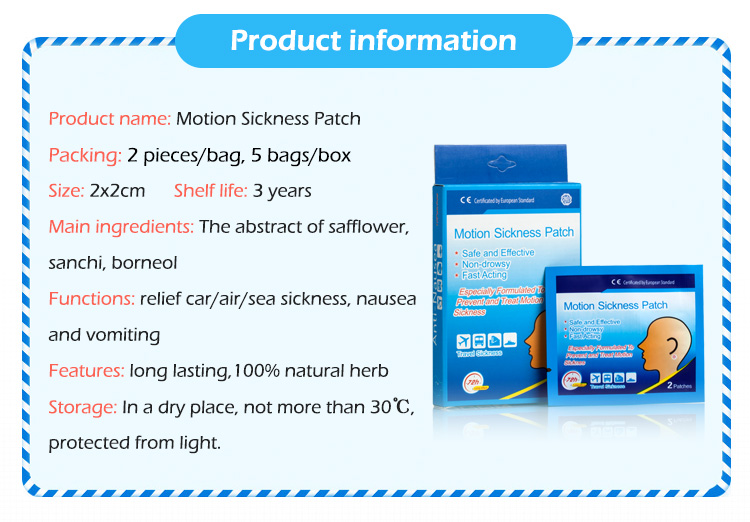Author:Kangdi 09-06-2021
What is motion sickness?If you've ever been sick to your stomach on a rocking boat or a bumpy airplane ride, you know the discomfort of motion sickness. It doesn't cause long-term problems, but it can make your life miserable, especially if you travel a lot.

Children from 5 to 12 years old, women, and older adults get motion sickness more than others do. It's rare in children younger than 2.
Motion sickness is sometimes called airsickness, seasickness, or carsickness.
What are the symptoms?
Motion sickness can cause:
A general feeling that you're ill.
Nausea.
Vomiting.
Headache.
Sweating.
Symptoms will usually go away soon after the motion stops.
What causes motion sickness?
You get motion sickness when one part of your balance-sensing system (your inner ear, eyes, and sensory nerves) senses that your body is moving, but the other parts don't. For example, if you are in the cabin of a moving ship, your inner ear may sense the motion of waves, but your eyes don't see any movement. This conflict between the senses causes motion sickness.
You may feel sick from the motion of cars, airplanes, trains, amusement park rides, or boats or ships. You could also get sick from video games, flight simulators, or looking through a microscope. In these cases, your eyes see motion, but your body doesn't sense it.
How is it treated?
You can try some motion sickness patch to prevent or reduce nausea and vomiting. These include:
relieving the vomit, nausea, dizziness, anorexia, and other symptoms resulted from sickness of cars, ships, airplanes, trains and other means of transport.
These tips may help you feel better when you have motion sickness:
Eat a few dry soda crackers.
Sip on clear, fizzy drinks such as ginger ale.
Get some fresh air.
Lie down, or at least keep your head still.
How can you avoid motion sickness?
It's best to try to prevent motion sickness, because symptoms are hard to stop after they start. After symptoms start, you may feel better only after the motion stops.
These general tips may help you avoid motion sickness:
Move your head as little as possible.
Don't drink alcohol or eat a heavy meal before you travel.
Don't eat or drink during short trips.
Try to avoid strong odours and spicy foods.
In a car
To avoid motion sickness when you travel by car:
Sit in the front seat.
Don't read or watch TV or videos.
In a plane
When you travel by airplane:
Ask for a seat near the wings.
Eat small meals of foods that are easy to digest before and during a long flight. This may help reduce nausea and vomiting.
On a ship or boat
When you travel by ship or boat:
Book a cabin near the middle of a ship and near the waterline. Sit in the middle of a boat.
Try to get fresh air.
Look at a fixed point on the horizon.
 0086 19937104978
0086 19937104978




